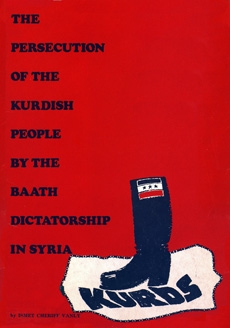| While the facts will speak for
themselves, responsibility for
the opinions expressed by the
author is solely his own.
I.C.V.
INTRODUCTION
The purpose of this brief work is to bring to the attention of the Arab world, international organizations interested or not, and world public opinion, a book about the Kurds written in Arabic by Mohamed Talab Hilal, a Syrian Arab who is now a minister in the Syrian government. Since the revolt began in Iraqi Kurdistan in 1961 a number of books have been written by Arab nationalists on the subject of the Kurds.
They include "The Kurdish Question and Arab Nationalism in the Struggle of Iraq" (undated) by Mahmoud Al Durrah, an Iraqi officer; "Limelight on the North of Iraq" in Arabic and English editions, Baghdad 1965, by Nauman al-Canaani, also an Iraqi officer; "Iraq and its North" in Arabic and English editions (author anonymous), published by Dar Al Jumhuriya Baghdad 1965, by courtesy of the Iraqi government; "Kassem and the Kurds, Daggers and Mountains", Baghdad 1961, by Ahmed Fawzi, also an Iraqi, this latter work being less anti-Kurd than the others and seeking to embark on a dialogue.
The pattern is familiar: in order to combat the Kurdish national liberation movement they try to discredit it, to "prove" that the Kurds are neither a people nor a nation, but an "agglomeration of tribes" with no national consciousness and no culture, who speak a dialect which is not a language but a "heterogeneous miscellany of foreign words", who practice brigandage under the guise of a national movement. This takes us back to the 'twenties and 'thirties, and the appearance of Turkish writings of the same type, at the time when northern or Turkish Kurdistan took up arms in an attempt to liberate itself. The process is classic, belonging to colonialism, nazism and fascism and the peoples who have been and still are the victims of such plagues are not the ones to refute us.
Scientifically and historically, such abusive assertions are not taken seriously. Thus no space has been devoted here to answering them, to proving recognised facts that the Kurds do indeed constitute a nation, a persecuted nation. But such publications, because of their moral or amoral political and military implications remain a cause for concern.
It is therefore necessary that the world take heed. The Arabs especially ... | 